Mehdi Hasan.
Even the mere mention of his name is enough to elicit a shudder. Not simply because he is a man of astounding ignorance who insists on parading his intellectual deficiencies as if they were hard-won laurels, nor because he lies with such effortless fluency that one wonders if mendacity itself were his first language. No, the true reason for my nausea upon hearing of Mehdi Hasan is that, against all reason and decency, he is taken seriously by seemingly intelligent people.
His ubiquity on talkshows, like Piers Morgan’s screaming matches, his position as a sought-after debater, and his grotesquely inflated media presence are all proof that one can traffic in the most odious drivel and still be lavished with prestige—so long as one does so with the right amount of smug sanctimony. His principal employer, Al Jazeera (funded by theocratic despots in Qatar), provides the necessary sinews of war for his ceaseless campaign to whitewash the ugliest facets of Islamism while posturing as a moral arbiter.
Take, for instance, his recent appearance on Piers Morgan’s program to discuss the so-called "Grooming Gangs"—a term as euphemistic as calling the Spanish Inquisition a "firm but fair theological discussion." The more precise label would be industrial-scale sexual slavery rings, in which thousands—some estimate as many as 25,000—young, predominantly white working-class girls were systematically raped and brutalised over the course of decades by predominantly Pakistani and Bangladeshi Muslim men in cities across the UK. And yet, when pressed on this ongoing national disgrace, Hasan’s response was exactly what one would expect from someone whose life’s work is the exoneration of his ideological kith and kin.
Rather than confronting the horror of the crimes or acknowledging the complicity of religious dogma, Hasan did what he does best: he obfuscated, deflected, and dissembled. He droned on about white offenders, feigned concern for victims while simultaneously chiding those who dare to mention race and religion, and even resorted to the laughably dishonest claim that Islam could not be a motivating factor in these atrocities because alcohol is forbidden in Islam. A finer specimen of bad-faith argumentation one could scarcely find.
Let us dismantle Hasan’s falsehoods one by one. His invocation of white criminals is a risible non sequitur. In any white-majority country, one expects white criminals to be numerically prevalent, but these grooming gangs were not simply the work of generic criminals—they were cohesive networks operating with impunity, justified by religious doctrine, and protected from scrutiny by a political establishment that feared being branded “Islamophobic.”
There was no comparable omertà surrounding white offenders. No council official, no police department, no journalist quailed at the thought of being labeled a racist for investigating white pedophiles. The same cannot be said for these Muslim-majority rape gangs, whose actions were ignored for decades precisely because their crimes were shrouded in the rhetoric of multicultural piety.
And then there is Hasan’s most tired and insidious deflection—the eternal lament that Islam is being "misunderstood." He and his ilk insist that Islam has nothing to do with terrorism, or misogyny, or mass rape, even when the perpetrators themselves invoke the Quran in their justifications (if you have the heart, listen to a survivor’s story here). If the pious hordes of ISIS, Al-Qaeda, Boko Haram, and the Taliban have all failed to comprehend the religion they kill for, then one is left to wonder: why is it that Islam is so uniquely prone to misinterpretation? Where is the Muslim Singapore? Where is the Islamic Switzerland? Why is it that Muslim-majority countries are invariably cesspools of oppression, corruption, and religious barbarism? Hasan, naturally, has no answer to this beyond his standard litany of whataboutisms.
Hasan’s debating style is similarly devoid of intellectual honesty. His modus operandi is to latch onto a minor verbal slip from his opponent, inflate its significance to absurd proportions, and pretend that he has thereby invalidated their entire argument. He once dismissed historian David Starkey’s critique of his past remarks because Starkey mistakenly referred to him as "Ahmad" rather than "Mehdi."A trivial error, but enough to send Hasan into triumphant peacocking, as though his entire record of Islamist apologetics had thereby been wiped clean (video here). When Anne Marie Waters referred to Saudi Arabia as the birthplace of Islam, Hasan sneeringly corrected her by pointing out that the modern state of Saudi Arabia was founded in 1932—a pedantic irrelevance that did nothing to refute her broader point (video here). In a debate with Douglas Murray, he dodged a serious discussion of multicultural failure by recounting an anecdote about his father finding dog litter in their mailbox—a rhetorical sleight-of-hand that should insult any thinking person’s intelligence (video here).
It is in these debates that Hasan’s real skill shines—not as a thinker, but as a sophist. He wields fallacies the way a pickpocket wields sleight of hand, banking on his audience’s ignorance to smuggle absurdities past their critical faculties. His entire career is a monument to the proposition that, in an age of moral cowardice, the most brazen deceiver can rise to prominence if he simply flatters the right prejudices and castigates the right enemies.
Ultimately, Hasan’s most odious quality is not merely his dishonesty, nor his penchant for manipulative rhetoric, nor even his habit of reducing serious discussions to trivial quibbles. It is his fundamental lack of intellectual courage. He thrives in environments where he can shout down, interrupt, and ridicule. He never argues in good faith because he does not possess the strength of mind to do so. He is a symptom of a diseased discourse in which bad actors are rewarded for their ability to muddy the waters, rather than for their capacity to clarify them.
In an era that truly valued integrity, Hasan would be a footnote—a small-time propagandist catering to a tiny audience of true believers. Instead, he is feted as a public intellectual. That is not a reflection of his talent, but of the lamentable state of public discourse, in which the most fraudulent voices are granted the loudest megaphones. But frauds can only sustain themselves for so long. Eventually, the weight of reality will crash down upon them, and when that day comes, Hasan will be remembered not as a serious thinker, but as an opportunistic hack who peddled evasions and half-truths until the tide of history left him behind.
(For readers who wish to learn more about the industrial-scale gang rape of teenage girls, follow the brilliant investigative reporting done by Charlie Peters (@CDP1882) and Guy Dampier (@dampierguy), or watch the great Andrew Gold’s episodes on the topic here with Raje Miah, and here with my friend Winston Marshall.)



What a brilliant takedown of a dangerous fraud.. This should really have millions of likes. It is exceptional writing.
Wow. Great to see such sharp writing in service of a concise summation of the subject. Mehdi is a sophist who profits off the degraded state of the discourse he’s contemporary to. Someone in the 5th chat linked a small panel show where PJ O’rourke and Christopher Hitchens discussed & debating Reagan. The audience who watched that wouldn’t tolerate such a lightweight like Mehdi, much less the media institutions who hosted such discussions.